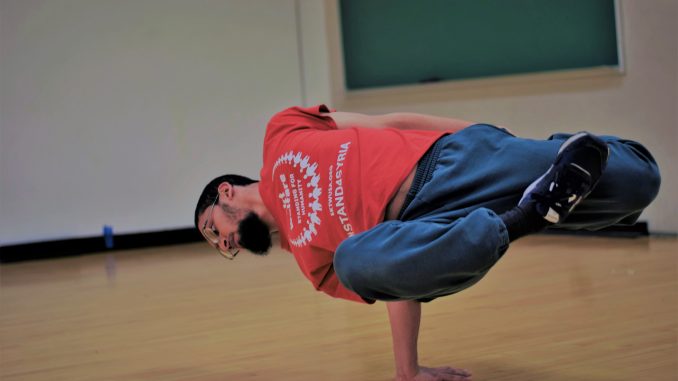
Sherril Dodds doesn’t look like a typical breakdancer, but the self-proclaimed “middle-aged British woman” is often at dance battles and practices at Temple and around the city.
Dodds, a dance professor, dances with b-boys, or break-boys, in the short documentary “Life Lessons in Hip Hop,” which was released last month. She directed the documentary with 2005 psychology alumnus Steve “Steve Believe” Lunger, Mark “Metal” Wong and the on-campus dance group Temple Breakers. The documentary aims to preserve breakdancing at Temple and in Philadelphia and emphasize the benefits of breakdancing beyond the studio.
“This is an art form that I’ve seen hundreds of people come into and have their lives, quite literally, saved by taking them off the street, by giving them something positive,” Lunger said. “It gives them something to be connected to, and it gives them a reason to care.”
Lunger and Wong cofounded Hip Hop Fundamentals, an organization that uses breaking to teach young people in the Philadelphia area about civil rights and the importance of education. He and Wong served as researchers for “Life Lessons in Hip Hop.” They are also friends and mentors to the Temple Breakers.

Lunger believes documenting and preserving breaking at Temple and around Philadelphia is crucial.
“That is really important to me because one, [Temple] is the school I came from and it gave a lot to me,” he said. “But two, because the people of the city, the Philadelphians that live here, don’t always have opportunities or access to the arts.”
In an effort to research hip hop dancers’ facial expressions for a larger project, Dodds connected with the underground breakdancing community by attending dance battles and practices. After discovering the community and feeling welcomed, she wanted to find a way to show her support. “Life Lessons in Hip Hop” was a way Dodds felt she could contribute.
“Universities are often known for the work they do in the curriculum or the work that the faculty do, but there are often these very rich culture practices going on that don’t get officially recognized by universities,” she said. “We wanted to really draw attention to these activities that happen late in evening, but not only do Temple students go, but lots of dancers from the local community come to Temple.”
“Temple is not only servicing its students, but other local community members from North Philadelphia and beyond,” she added.
Moosaa Khan, a junior education major and a background b-boy in the documentary, said it’s important to document this specific style of street dance to preserve its culture and history.
“Breaking, like any art form, changes,” Khan said. “So when the changes occur you wanna make sure that yes, [within] breaking there is a lot of freedom, but there is also a structure that needs to be adhered to.”
“Hip hop started as a way for troubled youth to let go of their anger in a non-criminal way, so it’s important that people understand that even if you weren’t born into that violent atmosphere, that you still understand that’s where it came from and you don’t try to change it into something it’s not,” Khan added.
Adriana Imhof can be reached at adriana.imhof@temple.edu.
CORRECTION: In a version of this article that appeared in print, it misstated Sherril Dodds’s position. She is the former chair of the dance department and a professor.


Be the first to comment